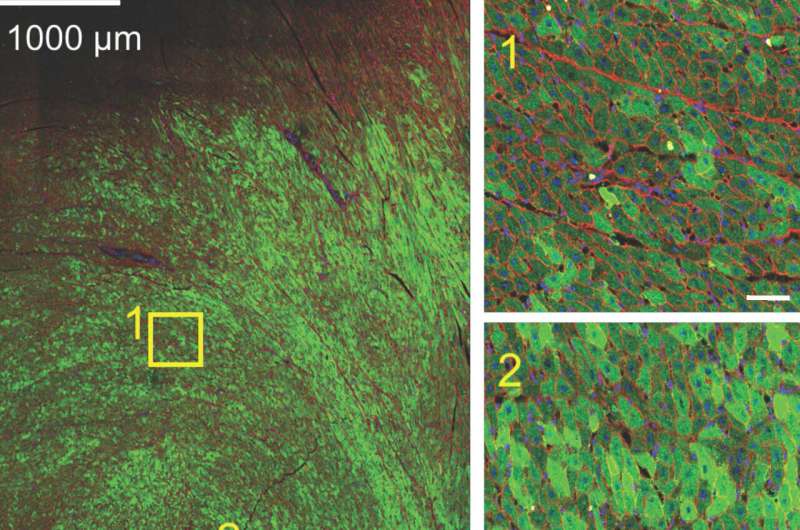New research moves novel gene therapy for heart failure closer to the clinic

Research at Baylor College of Medicine, the Texas Heart Institute and collaborating institutions is moving a novel promising gene therapy to treat heart failure closer to the clinic.
Published in Science Translational Medicine, the study showed that knocking down the Hippo signaling pathway in cardiomyocytes in the hearts of pigs after they had a heart attack, resulted in heart tissue renewal and improved function when compared with pig hearts in which the Hippo signaling pathway was not modified. Given that the pig's heart is considered a valuable model to study the human heart, the findings suggest that this gene therapy may be useful in treating human heart failure.
Heart failure remains the leading cause of mortality in the western world, causing more deaths than all cancers combined. The best current treatment for heart failure is a heart transplant, but the number of hearts available for transplant is limited, underscoring the need for alternative treatments.
"One of the interests of my lab is to develop ways to heal heart muscle by studying pathways involved in heart development and regeneration," said corresponding author Dr. James Martin, professor and Vivian L. Smith Chair in Regenerative Medicine at Baylor and director of the Cardiomyocyte Renewal Lab at the Texas Heart Institute.
Previous work has shown that when patients are in heart failure there is an increase in the activity of the Hippo signaling pathway, which acts to inhibit heart repair. Earlier work from the Martin lab revealed that turning the Hippo signaling pathway off in a mouse model that mimics advanced human heart failure resulted in the murine hearts recovering their pumping function.
"Encouraged by these results, we took the next step by testing whether turning the Hippo signaling pathway off in pig hearts would also help the injured hearts recover," said first author Dr. Shijie Liu, a postdoctoral associate in the Martin lab.
An essential first translational step before taking the gene therapy to humans
In the current study the researchers modeled in the pig what happens in a human patient that has a heart attack and assessed the effect of gene therapy knockdown of the Hippo signaling pathway on heart recovery.
"Pigs with a heart attack present a condition that is similar to what you might find in a human patient who has a blockage in the main artery of the heart, which leads to myocardial infarction," Martin explained. "After myocardial infarction in the pigs, we administered the gene therapy, to turn off Hippo directly in heart of the pigs. Finally, we compared the effects of therapy or no therapy on heart function."
"We were excited by the results," Liu said. "Three months after we treated the pigs, those that received the gene therapy had improved their heart function, showed signs that their cardiomyocytes were regenerating, had less fibrosis or scarring and had evidence that new blood vessels had formed. The procedure was shown to be safe since the pigs tolerated the therapy very well."
"Our findings support our goal to move on to human clinical trials," Martin said. "This is a potentially transformational strategy to treat human heart failure. It taps into the healing capacity of the heart, promoting heart muscle self-repair and improved function, which can make a substantial difference in the lives of those who suffer a heart attack."
More information: S. Liu el al., "Gene therapy knockdown of Hippo signaling induces cardiomyocyte renewal in pigs after myocardial infarction," Science Translational Medicine (2021). stm.sciencemag.org/lookup/doi/ … scitranslmed.abd6892
















